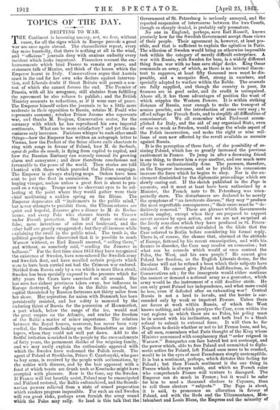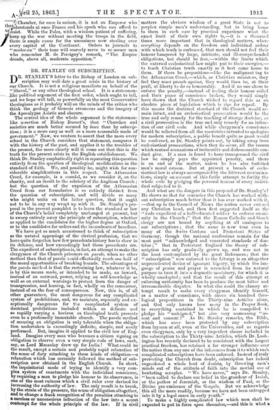TOPICS OF THE DAY.
DRIFTING TO WAR. Government of St. Petersburg is seriously annoyed, and reported suspension of intercourse between the two Cou though so sharply denied, is probably only premature.
No one in England, perhaps, save Earl Russell, knows precisely how far the Swedish Government accept these views of their people. Their agreement is, however, at least pos- sible, and that is sufficient to explain the agitation in Paris. The adhesion of Sweden would bring an otherwise impossible task within the category of merely difficult enterprises. A war with Russia, with Sweden for base, is a widely different thing from war with no base save ships' decks. King Oscar commands an army, of which, as there is no internal discon- tent to suppress, at least fifty thousand men must be dis- posable, and a mosquito fleet, strong in numbers, and specially adapted to warfare within the Baltic. The arsenals are fully supplied, and though the country is poor, its finances are in good order, and its credit is unimpaired. Above all, it has those advantages of position the want of which cripples the Western Powers. It is within striking distance of Russia, near enough to make the transport of armies possible, and the introduction of arms very easy ; to afford refuge for French fleets, and to simplify all difficulties of commissariat. We all remember what Piedmont accom- plished for Italy, and the aid of any organized Stilts, even of one so weak as Sweden, would change the whole aspect of the Polish insurrection, and make the eight or nine mil- lions of men now affected by the revolt available as recruits against Russia.
It is the perception of these facts, of the possibility of as- sisting Poland, which has so greatly increased the previous excitement in France. To jump in after a drowning friend is one thing, to throw him a rope another, and one much more likely to be enthusiastically done. The pressure, therefore, on the Emperor increases, and as he yields his concessions increase the force which he begins to obey. Nor is the ex- citement diminished by the diplomatic proceedings which are slowly oozing out. If the sketch published in the Pays is accurate, and it must at least have been authorized by a Minister, the French note to St. Petersburg was unex- pectedly stern. The disturbances are declared to be merely the symptoms of "an inveterate disease," they may "produce the most regrettable consequences ; " their cause must be "de- finitively removed." These are phrases which Governments seldom employ, except when they are prepared to support covert menace by open action, and we are not surprised at the lively sensation which they have produced in :it. Peters- burg, or at the statement circulated in the Globe that the Czar referred to Berlin before considering his formal reply. There is, of course, the chance that, alarmed at the attitude of Europe, fettered by his recent emancipation, and with his. finance in disorder, the Czar may resolve on concession ; but what can he concede which would itt once content the Poles, the West, and his own people ? He cannot give Poland her freedom, as the English Liberals desire, for the Russians will not be refused a boon which their subjects have obtained. He cannot give Poland half-freedom, as English Conservatives ask ; for the insurgents would either continue the contest or demand a national army as a guarantee, which army would be the instrument of a still deadlier strife. He can only grant Poland her independence, and what more could he lose, even if defeated after an exhausting war? Central Russia is not a land to invade, and the border is sur- rounded only by weak or impotent Pen-era. Unless there are forces at work within Russia, of which the West knows nothing, and which paralyze the Czar, es-en within the vast regions in which there are no Poles, his policy must be in accord with his inclination, and both lead to a blank refusal to submit to external force. It will then be for Napoleon to decide whether or not to let France loose, and he, of all men, remembers what Paris thought of the King whose Minister announced with complacency that "order reigned in Warsaw." Bonapartes can face hatred but not contempt, and the power which, able to free Poland and committed to diplo- matic action for Poland, left Poland once more to be crushed, would be in the eyes of most Frenchmen simply contemptible. It is but a sentiment, perhaps, which dictates this feeling for Poland ; but then French sentiment is the one thing in France which is always noble, and which no French ruler who comprehends France will venture to disregard. The Emperor can do much in France; but it would be safer for him to send a thousand electors to Cayenne, than to call those electors "subjects." The Pope is about, it is said, to pronounce an allocution in favour of Poland, and with the Reds and the Uftramontanes, Mon- talembert and Louis Blano, the Empress and the minority of the Chamber, for once in unison, it is not an Emperor who derstands at once France and his epoch who can afford to esist. While the Poles, with a wisdom patient of suffering, keep up the war without meeting the troops in the field, there is ample cause for the uneasiness now stealing over every capital of the Continent. Orders to journals to " moderate " their tone will scarcely serve to re- assure men who remember M. de Persigny's remark, "The Empire dreads, above all, moderate opposition."































 Previous page
Previous page